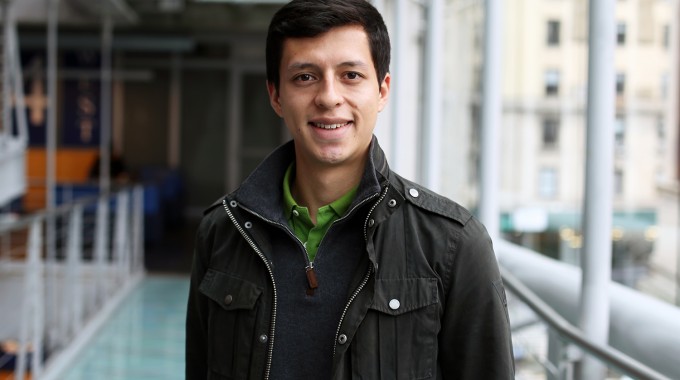If you know of a Columbia College student, faculty member, alumnus/alumna or program we should spotlight, or if you would like to submit a story, please contact:
Columbia College
Office of Communications
cc-comms@columbia.edu

“The memories of support, encouragement, joint-struggle, relief and joy I have shared with my friends at this institution [Columbia] are inspiring...I have learnt as much from my friends as I have from the classes I have taken.”—Juan José Guzmán CC’19
When Juan Jose Guzmán CC’19 decided to leave his hometown of Bogotá, Colombia to attend Columbia College, he made a promise to himself: He would fulfill his dream of studying in the U.S. and work toward a degree that would allow him to “promote an economic system that works for both people and the environment.” Eventually, he would return to the country [Colombia] he had only just begun to fall in love with as a teenager.
Guzmán’s matriculation coincided with seismic political change for Colombia. His first year, 2015, marked the eve of a peace treaty between the Revolutionary Armed Forces of Colombia (FARC) and the Colombian government. The fall of his sophomore year, Colombians held a referendum on the peace accord, which the Colombian congress later ratifying it. The country’s presidential elections would follow this.
Guzmán realized he did not need to wait to return home to do something for Colombia. He had become one of the leaders of the student organization, Columbia Por Colombia. In Spring 2017, “We decided to take a chance and organize a debate with the presidential candidates for the 2018 Colombian elections,” he said. Guzmán and fellow students wanted the opportunity to hear from and meet the candidates — on campus.
It was a significant undertaking requiring overseas coordination, intensive liaison and planning with the University administration and event logistics. But “after months of hard work, tears, happiness, and doubt, on March 23rd of 2018 we held in Roone Arledge Auditorium what ended up being the first debate of that year's elections,” he said.
Guzmán and partners opened Foro Académico Candidatos Presidenciales Colombia — an academic discussion for students to get the positions and personal perspectives of the leading Colombian presidential candidates, Iván Duque Márquez (now President of Colombia), former Mayor of Bogotá Gustavo Petro and former Vice President of Colombia Humberto de la Calle.
“Beyond the event itself, the fact that a group of less than 10 undergraduate students, through teamwork and collaboration, were able to gather enough momentum to bring the three front-runners to New York is something I still look back at with awe,” Guzmán said. “We showed the Colombian community abroad that [although] we are not back home in Colombia, [that] does not mean we can't significantly contribute to our country. This is of course an achievement I will never forget.”
The work to bring the debate to life symbolized the perseverance, compromise and loyalty that Guzmán notes “marked my time at Columbia — whether in the classroom, at work or in my personal life. The challenges I faced, and the people I was able to learn from, made me realize that without these, nothing would have been possible.
“The memories of support, encouragement, joint-struggle, relief and joy I have shared with my friends at this institution are inspiring,” he said. “I have learnt as much from my friends as I have from the classes I have taken.”
Graduating with a degree in economics and sustainable development, Guzmán wants to work at the nexus between economic policy, finance and the private sector. But he also has been enriched by the humanities education he’s gained at Columbia, including a study abroad in France during his junior year.
“Studying in Paris gave me time to take a step back and reflect upon all of my Columbia experience thus far, to redraw my path towards graduation, as it seemed murky at the time. Being able to be amazed taking Art Humanities while walking through the galleries of the Louvre, the vaults of Chartres Cathedral, all while concluding three years of studying French was fantastic and definitely the best stop of my Columbia journey.”
After commencement, Guzmán will work with a New York City advisory group, exploring financial systems that support economic prosperity, social equity and environmental preservation for rural enterprises and smallholder farmers. He plans to continue developing Multilateral, a podcast in Spanish that showcases sustainability one case at a time.
As for going home to Colombia, when he does, Guzmán returns to a hobby: painting introspective, eclectic pieces. “The main subject in many of them is just color, without any clear shape or form. Having taken Art Humanities I can say for sure that my paintings are far from being abstract!”
The work is full of color and ideas, not unlike the artist-organizer.